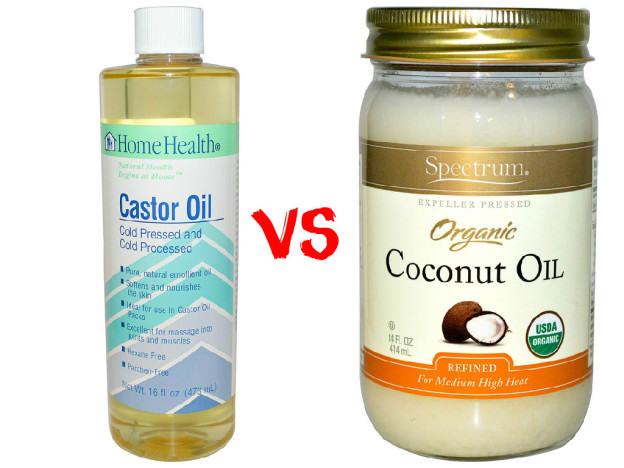Which Is Better? Coconut Oil Or Castor Oil?
 Well that depends on who you ask. This isn’t a post that will give you a definite answer that suits everyone, rather the point of looking at these two oils together is so that you can make an educated decision about which of the two are best for you. Or even better than that, can you successfully use both in your regimen where they are both effective?
Well that depends on who you ask. This isn’t a post that will give you a definite answer that suits everyone, rather the point of looking at these two oils together is so that you can make an educated decision about which of the two are best for you. Or even better than that, can you successfully use both in your regimen where they are both effective?
I am a flex oil type of girl! I totally made that up but what that means is that I use different oils* for different occasions or different instances in my regimen. In addition to that I know women who are absolutely allergic to coconut oil or castor oil so they cannot have either one in their regimen and that is what is best for them.
What is coconut oil*?
Coconut oil is a bi-product of the coconut, it is a fatty oil; that is, it can be useful in cooking, consuming, for your skin and your hair. Coconut* oil reminds us of hydrolyzed protein because it is one of only a limited number of oils* that can penetrate the hair strand fortifying it from the inside out.
What is castor oil*?
This oil is also a bi-product, but this time from castor beans. You can find castor oil* in many manufacturing oil based products because it is a pretty heavy oil. In the hair community castor oil is mostly known for its ability to regrow edges and help with hair loss on other areas of the scalp.
When you are trying to determine which of these oils is better, you must consider a couple of things. Are you allergic to any of them? Are you protein sensitive? Does your hair prefer a heavy oil? Are you suffering from hair loss? Only then can you decide which is better.
Are you allergic?
Nut allergies are no joke so if you have one, coconut oil* might not be the right oil for your regimen at all. In addition to that coconut* oil has been described as an “acne aggravating ingredient” for some women causing a ton of skin irritation even on the scalp. When you use it in your hair or on your skin and you discover redness, bumps or excessive fungus and dandruff, you are more than likely allergic.
Even though serious allergic reactions to castor oil is rare, it is important to know that you can be allergic to that oil as well. The oil is known to cause itching, redness and general irritation which renders it rather ineffective for you if you are allergic. Allergies will single-handedly make one oil better for you than the other by pure default, moving on!
 Do you have fine or coarse hair
Do you have fine or coarse hair
For those of us with fine hair avoiding the use of heavy oils on the strand is super important so for us Castor oil as a sealant is a huge no no. Coconut oil* on the other hand is perfect in small amounts for sealing in moisture for fine strands.
Castor oil does not have to be eliminated from a fine haired girl’s regimen though. Castor oil is great when using in deep conditioner* mixes or for hot oil treatments before a shampoo.
Coconut oil* can really amp up an oil mix and is great for scalp massages once you have determined that you are not allergic.
If you have thicker, coarser strands you might find yourself oil rinsing with castor oil weekly, using it for deep conditioning*, or even sealing with it.
You will probably decide that coconut oil is great for the Summer time because you also prefer a lighter oil at that time. In all of these cases, the oils can be used in a variety of ways that suit you and your hair.
Are you protein sensitive?
Protein sensitivity just means that when you use protein at certain times your hair becomes extremely hard and dry; however, this does not mean that you never ever use protein because your hair does need it for strength.
Women who are protein sensitive might find that when they use coconut oil it might lead to dryness and hardness. The key to using coconut oil or protein when you are ‘protein sensitive’ is using it sparingly and with heat for deep conditioning*.
Once the cuticles are raised and the oil is in the strand your hair will not feel so dry or even hard. Castor oil* on the other hand might be a favorite of yours.
Are you suffering from hair loss?
When you have hair loss using castor oil on the areas that need it the most is ideal because castor oil* is known to jump start your hair follicles.
Coconut oil is also known for helping hair loss in the sense that it strengthens the roots of your hair and the strand itself preventing hair fall.
Creating an oil mix with both can speed up the process of hair growth along with everything that your medical practitioner suggests.
So which is better? We end the same way we started, it depends on who you ask, every oil has its benefits and side effects, you have to pick the best one for you.




